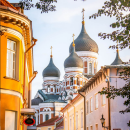
Italy Foodie Itinerary
There's a lot to love about Italy. Whether you're in it for the ancient Roman history, the designer fashion, or the charming coastal villages, every tour of Italy is a foodie tour. If you're mainly in it for the food, these are the hotspots for you!
Milan
A popular rail gateway to Italy from the rest of Europe, Milan is also a gateway for Italian fashion around the world. It's popular cathedral and Da Vinci's "The Last Supper" are also high on tourists' lists when it comes to attractions. The foodies, however, come for other reasons.
What to eat: Risotto alla Milanese. There are plenty of variants, but one could argue that among Northern Italian risottos, Milan-style risotto is king. Featuring a yellowy color achieved with the gradual addition of saffron during cooking, Risotto alla Milanese is usually a first course or accompaniment for another Milanese delicacy, Ossobuco, or wine-braised veal shanks.
Local tip: If it's still a bit early and you need something to hold you over until dinner, head out in the afternoon for a Milanese aperitivo. Something akin to a happy hour, you'll find little snacks appearing with each negroni, spritz, or other orange, appetite-rousing cocktail that you order. These drinks usually feature bitter or sweet Italian liqueurs and/or vermouths in varying combinations.
Emilia-Romagna
Despite this region being home to some of Italy's fastest automobiles, such as Lamborghini and Ferrari, you'll want to take it nice and slow when it comes to appreciating the never-ending culinary variety that arguably makes it the culinary center of the country.
What to eat: Everything. Choosing one or even a handful of things to eat in Emilia-Romagna is like picking your favorite few stars out of the sky. It's one of those places where you really cannot go wrong no matter what you eat. That said, it's especially known for specialties like Bologna's tagliatelle al ragù and mortadella, Parma's parmesan cheese and prosciutto, and Modena's tortellini and balsamic vinegar.
Emilia-Romagna is also a prominent wine region where lambrusco, a lightly-sparkling red wine, is the bottle of choice in most restaurants.
Local tip: Emilia-Romagna's products use unique recipes and techniques that sometimes date back centuries. Artisan producers throughout the region offer tours of their facilities giving visitors a unique opportunity to really connect with the history behind each food. It's a great way to support small, local producers while at the same time gaining profound insight into their processes.
Florence
The capital of Tuscany has a lot of connotations: beautiful Renaissance art, architectural wonders around every corner, literature, fashion, and the list goes on and on. Where so many creative minds have collided over the centuries, there's bound to be some good food. Florence doesn't disappoint.
What to eat: Bistecca alla fiorentina. You can't consider yourself a steak-lover until you've heard of bistecca alla fiorentina or Florentine steak. This huge t-bone steak from Chianina breed cattle usually weighs in at over 1 kilogram. It's seasoned simply, grilled at high temperatures, and served the way the chef prefers, which is almost always rare. Pair it with a chianti classico wine and you can't go wrong.
Local tips: Florence has a special street food reserved for the adventurous foodies who can "stomach" it. Lampredotto sandwiches are made with a soft bread and filled with tender, thinly-sliced tripe and your choice of sauce. Go all the way and get the bread dipped in the broth for the full Florentine experience.
Florence certainly has carnivorous inclinations, but vegetarians can find solace in Florence's fabulous porcini mushroom and truffle tagliatelle pasta or ribollita, a vegetable and bread soup.
Naples
Naples is the capital of the Campania region in Italy, making it a great central point whether you're in the neighborhood for Mount Vesuvius or for mozzarella. Close proximity to Pompeii, Sorrento, and the island of Capri leaves plenty of opportunity for adventure. Culinary adventurers will feel equally at home.
What to eat: Pizza. When it comes to foods that are loved all around the world, there's always something special about going back to basics. That is why going to Naples is a pizza-lover's pilgrimage. Here you can try the original pizza which is carefully regulated to adhere to strict local norms for ingredients and production. The thin-crust pizza allows for limited ingredients including locally-sourced tomato, mozzarella cheese, basil, and extra-virgin olive oil.
Finish off your meal in Naples with a lovely limoncello, a lemon-based liqueur intended as a digestivo, or post-meal drink, to aid in digestion.
Local tips: Naples is also a fantastic city for coffee-lovers, with some saying the coffee here is the best in all of Italy. If you've got a bit of a sweet tooth, order your coffee with cremina, a creamy mixture of whipped-up sugar and coffee.
Sicily
The next stop on our list is the island of Sicily. Boasting culinary influences from around the Mediterranean, Sicily is all about fresh, local ingredients.
What to eat: Arancini. These stuffed balls of rice may stem from Arab traditions, but the present-day arancini have evolved into a dish that is purely Sicilian. Fillings can include meats, vegetables, cheese, or sauces. Once assemled, the balls are breaded and fried until they resemble little oranges, hence the name arancini.
Local tips: Fresh fish is abundant in Sicily, and you can find light, simple seafood dishes all over the island that make for an equally delicious alternative to the heavy arancini. Pasta con le sarde (pasta with sardines) is a very common option.
When it's hot outside, cool down with a granita, a refreshment made with ground ice, sugar, and fruit. Sometimes, the fruit is substituted with coffee, pistachio, or other delicious flavors.
Rome
You didn't think that we'd skip the Eternal City in our Italy foodie lineup, did you? Here, you can find plenty of variety from around the whole country, but when in Rome, you've got to do as the Romans do.
What to eat: Pasta Carbonara. An emblematic prepation of pasta with a cheesy, egg-based sauce and pan-fried guanciale (cured pork cheek). Different restaurants use different pastas, but go for a thicker variety that can stand up to the richness of this indulgent sauce. If this sounds delicious, but you prefer to skip the meat, cacio e pepe, made with pecorino romano cheese and black pepper, is a very suitable and equally delicious alternative.
Local tip: Start the day off right with a maritozzo for breakfast. These sweet bread rolls with fresh whipped cream make for a winning beginning of a day spent sampling Rome's delicious variety.
Genoa
As you make your way up Italy's western coast, you'll come across countless charming Ligurian villages, such as those of Cinque Terre, begging for a nice hike to get that perfect photo from one of the jagged cliffs that meet the Mediterranean. This is the perfect way to work up an appetite for dinner in Genoa.
What to eat: Pesto alla genovese. This Italian classic is a nice break from some of the heavier items on this list. Usually served as a sauce for pasta, Genoese pesto is a fresh and fragrant blend of basil, pine nuts, garlic, parmesan cheese and olive oil. There's beauty in simplicity, which is why pesto alla genovese is such a favorite.
Local tip: The city's seaside location makes a wide variety of seafood dishes readily available, so keep an eye out for unique soups, stews, and salads featuring fresh seafood. Genoa is also the birthplace of focaccia bread, so don't leave without trying some!
Start dreaming about your foodie adventures
You could spend a lifetime uncovering the great culinary secrets of Europe, so now is as good a time as any to start dreaming. Check out our Ultimate Foodie Itinerary as a solid foundation for foodie must-eats. As they say in Italy, Buon appetito!
通貨の変更
カートに入れたパスの通貨を変更することはできません。パスを削除してからウェブサイトのヘッダーの通貨を変更してください。





